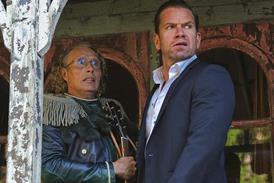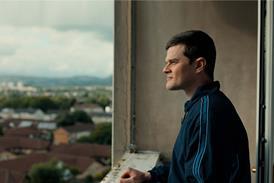Dir:Richard Eyre. US-UK. 2004. 106mins
Likeits cross-dressing hero Ned Kynaston (who makes his name playing female partson stage), Stage Beauty isn't entirely sure of its own identity. On theone hand, this is a bawdy and colourful Restoration-era romp, stuffed full ofpuns and sexual innuendo and propelled by some tremendous character turns. Onthe other, it's a closely focused study of a tormented actor who can't escapehis stage persona as "the most beautiful woman in the house". Along with thecod-piece humour and agonising about gender, role playing and identity, thefilmmakers throw in backstage drama and conventional romance. Jeffrey Hatcher'sscreenplay (adapted from his play Compleat Female Stage Beauty) isingenious but so packed with different elements that the film can't help butfeel overloaded. Thankfully, the vigorous direction and exceptional centralperformances help override the lurches in style and tone.
USdistributor Lion's Gate is setting up Stage Beauty for award nominationsin the autumn. Given the success Miramax enjoyed with the similarly-themed ShakespeareIn Love, the film looks likely to receive its share of prizes and criticalkudos. Commercial prospects also look reasonably rosy, though younger audienceshoping for a dating movie in period dress may be daunted by the complexity ofmuch of the wordplay and Billy Crudup may not be a big enough box-office drawto carry the film on his own.
Actionbegins in the 1660s with Ned (Crudup) at the top of his game. Charles II hasonly recently been restored to the throne and women are forbidden to appear onstage. In their absence, Ned, who served a long apprenticeship learning how toplay in drag, is the cynosure of the London stage. His Desdemona is especiallycherished by audiences. He has important patrons in the shape of his lover, theDuke of Buckingham (Ben Chaplin in saturnine groove), and his theatreimpresario boss (Tom Wilkinson) who offers him a share in the company and aveto on actors he'll work with.
Earlyon, the comic scenes are handled with tremendous verve. We see Ned afteranother triumphant performance riding in the back of a carriage with twonoblewomen. He is still in female garb and they're determined to discover whatlurks under his skirts. (Sure enough, he turns out not only to have 'athingy' - as they coyly call it - but 'a big and bulging oar andsceptre of a thingy.') As he says his goodbyes to his admirers, an obesearistocrat (Richard Griffiths), in search of a mistress, propositions him onthe streets under the misapprehension he really is a woman. He too sticks hishand under Ned's skirt. Though startled by what he finds there, he doesn't seemdissuaded. Ned spurns him, thereby making a mortal enemy.
Thefilmmakers skilfully interweave the rowdy humour with the on-going court andbackstage conspiracies. Ned has a dresser, Maria (Claire Danes), who seems tobe devoted to him, but a little like Anne Baxter with Bette Davis in AllAbout Eve, wants to usurp his position for herself. The King (RupertEverett) is cajoled by his mistress Nell Gwynn to allow women back on stage. Hedoes so. He then bans men from playing women, thereby precipitating Ned's fallfrom grace.
It'ssurely an indictment of the current British star system (or lack of one) thatRichard Eyre, a former director of the UK's National Theatre, chose to castAmericans in the lead roles. Nonetheless, one of the chief pleasures of StageBeauty are the supporting performances from British character actors.Having played Charles I in To Kill A King, Everett excels as Charles IIhere. The King seems a foppish and foolish figure, but he's wiser than he firstappears. Everett brings out both the humour and pathos in the character who(like Ned) knows all about the pain of exile. Richard Griffiths, meanwhile, contrivesto steal most of the scenes in which he appears.
Sometimes,the film sags under the weight of its cultural references. There are too manyjokes about Pepys and Dryden. Nor is the score always graceful. At its mostupbeat, George Fenton's score sounds disconcertingly like the frantic,toe-tapping music from Michael Flatley's Lord Of The Dance. Still, thefilm possesses an energy which many heritage pictures lack. Eyre has statedthat he wanted to make Restoration London seem as vivid and contemporary as NewYork's East Village. Using CGI as well as a small army of extras, he succeedsin catching the bustle and noise of a modern-day city. Following the example ofNicholas Hytner in the film of The Madness Of King George, hecontinually undercuts scenes of courtly formality by including some comicbusiness at the edge of the frame. King Charles, for example, is alwayssurrounded by an entourage of floppy-eared spaniels and is forever beingscolded by his mistress, Nell Gwynn.
Crudupis a surprisingly subtle and understated female impersonator. There's littleEdna Everage style posturing here. Though he's not above a little coquetery, heplays it (so as to speak) straight. His gestures are precise but nevermannered. His voice is soft without being strident. The scene in which heauditions before the king as Othello but can't help resorting to femininegestures could easily have seemed camp or comic, but Crudup plays it with suchintensity that it ends up being very moving. Danes, too, impresses as the actresson the make.
Inevitably,Stage Beauty finishes on a conventional note. By the final reel,Crudup's Ned has worked out how to act like a man and realised that Maria loveshim (after almost killing her when he plays Othello to her Desdemona.)Throughout, there's a tension at the heart of the film - a sense that it wantsto be radical, perverse and provocative but cater to a mainstream audience atthe same time. Whether or not it reconciles these competing goals, it iscertainly richly entertaining fare.
Prodcos: N1European Film Produktions GmbH & Co KG, Qwerty Films, Tribeca Prodns
Intl sales: Icon
UK dist: Momentum
Exec prods: Michael Kuhn, Richard Eyre
Prods: RobertDe Niro, Jane Rosenthal, Hardy Justice
Scr: JeffreyHatcher
Cine: AndrewDunn
Ed: TariqAnwar
Prod des: Jim Clay
Music: GeorgeFenton
Main cast: Billy Crudup, Claire Danes, Rupert Everett, Tom Wilkinson, Ben Chaplin,Hugh Bonneville, Richard Griffiths, Edward Fox















![[Clockwise from top left]: Paul Thomas Anderson, Chloe Zhao, Ryan Coogler, Park Chan-wook](https://d1nslcd7m2225b.cloudfront.net/Pictures/274x183/9/0/0/1467900_writerdirectors_192733.jpg)


No comments yet